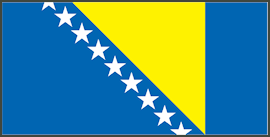Ministry of Defence
 The signature of the Dayton Agreement found the country to have two different armies, divided according to national and ethnic lines. Each of the two entities making up the country had its own defence, including defence ministries, and consequently its own army. In addition, there were entity defence systems alongside with entity defence ministries. Hence, one of the most relevant challenges over the last years has been the promotion of concrete steps to unify the BiH defence system. Since 2003, when the OHR established a Defence Reform Commission (DRC), two successive reforms have been carried out in BiH. In particular, the DRC emphasised the importance of creating a Joint State Level Command Structure, alongside with a significant reduction of the armed forces and a state Ministry of Defence.
The signature of the Dayton Agreement found the country to have two different armies, divided according to national and ethnic lines. Each of the two entities making up the country had its own defence, including defence ministries, and consequently its own army. In addition, there were entity defence systems alongside with entity defence ministries. Hence, one of the most relevant challenges over the last years has been the promotion of concrete steps to unify the BiH defence system. Since 2003, when the OHR established a Defence Reform Commission (DRC), two successive reforms have been carried out in BiH. In particular, the DRC emphasised the importance of creating a Joint State Level Command Structure, alongside with a significant reduction of the armed forces and a state Ministry of Defence.
A narrow reform was achieved with the adoption of a first law in 2003. However, it can be said that most changes were brought about especially by the second part of the reform adopted in November 2005. The core of this second legislative step lies in the adoption of more radical provisions than the previous one. The cited provisions concern the functioning of the Ministry of Defence as well as the structure of the Armed Forces of BiH. In particular, the reform provided for the closing down of entities Ministries of Defence and entities armies, the abolishment of general military obligations, the creation of a single State-level defence budget and the full parliamentary oversight over the AFBiH. It can be said that the 2005 laws provided BiH with an important restructuring of the defence system that never existed before.
- The Presidency of Bosnia and Herzegovina has supreme command and control over the Armed Forces of Bosnia and Herzegovina.
- The Parliamentary Assembly of Bosnia and Herzegovina conducts civilian control over the Armed Forces of Bosnia and Herzegovina.
- The Ministry of Defense of Bosnia and Herzegovina is in charge of the overall strategy and policy for the defense system of Bosnia and Herzegovina.
- Joint Staff of the Armed Forces of Bosnia and Herzegovina [Joint Staff of the AF BiH] is responsible for planning, organization and implementation of the directive and orders of the Minister of Defense of BiH.
- Operative Command of the Armed Forces of Bosnia and Herzegovina [AF BiH] implements the policies of the Joint Staff of the AF BiH.
- Support Command of the Armed Forces of Bosnia and Herzegovina manages personnel, logistics and training matters.
Based on Decisions of the Presidency, the Minister of Defence issues bylaws, directives, regulations and orders for the organisation, training, equipment, deployment and use of the Armed Forces. The Minister of Defence develops the Bosnia and Herzegovina defence budget. He is positioned at the head of the strategic planning chain for armed conflicts, peace support operations and natural disaster response; he exercises command and control of military intelligence activities; and recommends appointments and removals of General Officers to the Presidency. The Minister of Defence is authorised to oversee, monitor and inspect the Armed Forces at all levels.
Parliamentary oversight of the Armed Forces is implemented through the Parliamentary Assembly of Bosnia and Herzegovina and entity Parliamentary Assemblies, in accordance with their competencies in the field of defence. The Parliament of Bosnia and Herzegovina has the supreme authority to declare states of war or emergency, to issue laws, and to oversee and investigate issues related to the organisation, funding, staffing, training, equipment, deployment and use of the Armed Forces of Bosnia and Herzegovina. The Parliamentary Assembly also confirms appointments of General Officers.

|
NEWSLETTER
|
| Join the GlobalSecurity.org mailing list |
|
|
|

